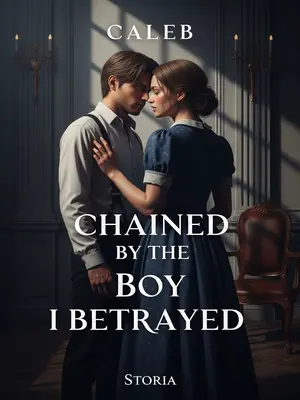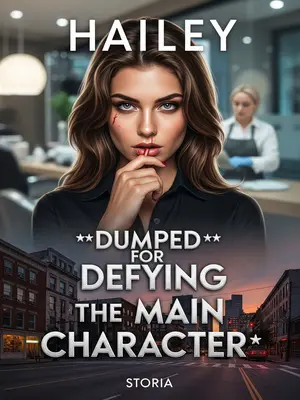Chapter 1: Second Chances and Old Scars
The day I decided to get a divorce, my husband shoved me down the stairs. When I opened my eyes again, I was back in my freshman year of high school. This time, I was determined to keep my head down, ace the SATs, and just live like any other stressed-out teenager—no drama, no disasters, just a regular student life. But somehow, the guy who’d been my husband in my last life kept popping up in front of me. I couldn’t help but wonder—was our meeting just some freak coincidence, or had everything been set up from the start?
Staring at Mr. Williams, who was on a roll at the front of the classroom, I glanced around at my classmates, all laser-focused and scribbling notes. I felt totally out of it. One second ago, I’d been fighting with Mason Holt about the divorce. I stood my ground, ready to walk, but Mason wouldn’t let me go. He lost it and pushed me down the stairs. The sharp edge of a step cracked against my head—white-hot pain, so blinding it almost felt numb. I felt warm blood pooling under my skull. The last thing I saw before my eyes slid shut was Mason’s twisted, horrified face. For a second, I just let go. Fine, let it end here. At least I’d finally be free.
It’s funny, the stuff your brain grabs onto when you think you’re dying. The harsh smell of floor cleaner, the faint drone of a neighbor’s TV, Mason’s voice turning to static in the background. Even as everything went fuzzy, this weird calm washed over me—a freedom I hadn’t felt in years. All the broken promises, the nights I never slept, just… gone. I almost laughed. Weird, right?
But when I opened my eyes again, I was sitting in a classroom. After getting married, I’d lost track of all the nights I’d spent awake, regret eating me alive. Only I knew how much I regretted missing the SATs. Every time I saw college kids laughing on campus, honestly, I was jealous as hell. I used to be the star student, the teacher’s favorite, the kid everyone pointed to. My dream was always a top university. How did I end up here?
I felt like I’d landed in someone else’s life. The sharp tang of dry-erase markers, pencils tapping, sunlight spilling across the tile floor—stuff I’d almost forgotten. The ache of regret that had haunted me for years twisted into something new: hope. Hope. Maybe, just maybe, this was my chance. Maybe I could actually fix things.
Back in those days when I felt like a ghost, I dreamed of going back to school. So now, sitting in this bright classroom, I held my breath, afraid to move. If I made a sound, maybe I’d wake up and lose all of this. Let me stay here forever.
I pressed my palms against the desk, feeling the smooth wood under my fingers. The air buzzed with the old ceiling fan’s hum, and I was sure if I blinked, I’d disappear. I barely dared to breathe. Just let me hold onto this moment. Please.
Until someone called my name.
“Rachel Foster, you’re the only one in the class who solved this problem. Can you explain your approach to everyone?”
All eyes turned to me—those familiar, long-lost looks of admiration and envy.
My name bounced around the room, snapping me out of my daze. I could practically feel the curiosity, the weight of every stare. It was electric—like stepping onto a stage for the first time, the spotlight blinding. For a second, I realized how much I missed this.
I tried to play it cool. Even when Mr. Williams’s sharp gaze met mine, I didn’t flinch. I was scared that any movement would pop this bubble. The silence stretched for a few seconds before my deskmate poked my arm.
She whispered, “The teacher’s calling you.”
I froze. Her touch was warm, so real it jolted me. No, this wasn’t a dream. …No one hears their own pounding heartbeat in a dream.
My heart hammered in my chest, echoing in my ears. I could smell her strawberry lotion, feel the nervous tremor in her finger. This was real—so real it hurt. I swallowed hard, steadying myself.
There was no waking up from this.
I shot to my feet without thinking. The problem on the whiteboard looked familiar, but my mind was blank. I just stood there, silent, not a word coming out.
“Sit down,” Mr. Williams said gently, not even a hint of anger in his voice. “Are you feeling unwell?”
After running five minutes over, Mr. Williams finally wrapped up going over the test. When class ended, he came over, still looking worried.
“Have you been pushing yourself too hard? Do you want to see the nurse?”
That’s the upside of being a good student. Screw up and freeze, and instead of scolding you, the teacher just worries you’re sick.
I shook my head. “I’m fine, just got a little dizzy. I’m okay now.”
He nodded and walked out of the classroom.
I watched him go, his boring teacher shoes squeaking on the linoleum. Teachers like Mr. Williams were a rare breed—fair, kind, the kind who’d remember your name forever. For a second, I thought I might cry, but I kept it together. Not now. Not here.
My deskmate was sipping water. Two girls in front of me argued over a math problem. Another kid dashed by, stirring up a breeze that sent my papers fluttering. The classroom buzzed, and the air was thick and hot. I could feel every breath. Everything was so real. Right then, I finally believed it—I had really been reborn. I was back in my freshman year of high school.
Sunlight poured through the windows, warmer than I remembered. Everything felt weirdly nostalgic—the smell of old textbooks, the metallic tang from the water fountain down the hall. I pressed my hand to my chest and let out a shaky breath. This was my second shot. I wasn’t going to waste it.
Mr. Williams was my homeroom and math teacher that year. Flipping through my textbook, I realized—so this was spring semester, huh? There was just over a month left before summer break. I couldn’t even remember most of my classmates’ names, and the textbooks I’d once breezed through now seemed like gibberish, not to mention the crazy math and physics problems. I could barely even read the questions. But none of that mattered. What mattered was that I was back in high school, I could keep studying, and I had another chance at life.
I ran my fingers over the pages, tracing old doodles and faded highlighter. The words blurred, but I didn’t care. I was here, right where I needed to be. My mind buzzed with plans—study schedules, college dreams, everything I’d given up on. Hope pulsed in my chest.
By the time school let out, my arm was covered in little pinches—just to make sure this was real. I barely felt the sting.
I felt like I was buzzing. As I packed up my bag, someone called my name from outside the window.
“Rachel! Hurry up!”
I looked up to see Madison Rivera leaning against the window, waving. She’d been my best friend since we were kids. Even when everyone else bailed, she was there for me.
Her voice was bright as ever, cutting through years of loneliness. Madison always made the worst days feel lighter. I swallowed a lump in my throat, remembering all the times she’d stood by me when no one else did.
We lived in the same neighborhood and had been inseparable since kindergarten. I’d scored highest on the high school entrance exam, so Silver Heights High gave me a full three-year scholarship. Madison had thrown a fit with her parents until they paid a hefty out-of-district transfer fee to get her in, too. She’d grinned and said, “Now we can walk to and from school together again!” We’d walk home every day, kicking rocks and swapping stories. Our houses were only a twenty-minute walk from school.
I could see us as little kids, backpacks bouncing, racing down cracked sidewalks. The world felt tiny then—just the two of us, dreaming big. Madison always made me let her win our races. Just to see her grin.
On the way, Madison started griping about her class—how nobody cared about studying and how she was desperate to get into the honors class next year. I remembered she’d always vented about the slackers in her class during freshman year. Even though Silver Heights was a top school, plenty of kids got in by paying big bucks but didn’t care about grades. Madison was one of the fee-payers, but unlike most, she’d actually wanted to be there. She worked hard, but maybe she just didn’t have the knack—her grades hovered around upper-middle. She’d bombed the entrance exam from nerves and missed the cutoff. Almost no one in her class took studying seriously.
I just nodded, letting her vent. Madison’s determination was her best trait—she never let herself slack, even when it was hard. I admired that about her, even when I didn’t always get the pressure she put on herself.
I told her, “Don’t worry, with your grades, you’ll totally make it into honors next year. And once you pick your track, you won’t have to study chem and physics anymore—your scores will shoot up.” I meant it. Madison did get into honors sophomore year and ended up in my class. Without science dragging her down, with my help and her own hard work, she eventually made the top ten.
She grinned, her eyes lighting up. I squeezed her arm, trying to pass along some confidence. We always had each other’s backs—at least, that’s what I thought then.
“From your mouth to God’s ears, genius! I hope I can make it!” she said, hooking her arm through mine. When we got to the neighborhood gate, we split up. “Same as always, come to my place later!” she called. I remembered how I’d always go to her house after dinner to do homework. She’d ask for help, and I’d explain everything.
Her house always smelled like fresh laundry and cinnamon toast. I could picture us sprawled on her bedroom floor, giggling over inside jokes, her mom poking her head in with snacks. Those evenings felt safe, like a little bubble away from the rest of the world.
But now that I’d just come back to life, I’d forgotten the material myself. My stomach twisted with nerves. I blurted, “My brother’s about to start eighth grade. My mom wants me to help him for a while, so I can’t do homework at your place.”
“Tyler Foster, that math flunk-out who scored a 12 on his last test? Is there even a point in helping him?” Madison huffed. “Didn’t he say he was gonna drop out and become a barber or something?”
I forced a worried look. “You know my family. I can’t say no to my parents.”
“Fine.” She looked annoyed, but what could she do?
I could tell she wanted to argue more, but she just rolled her eyes and shrugged. I let out a tiny sigh of relief. Madison never liked losing our study sessions, but she knew not to push too hard.
When I got home, everyone was already eating. They never waited for me—not that I expected them to. Still, it was better than before. I went to the kitchen, grabbed a plate, and sat down alone. There were three dishes and a soup, but except for the chicken wings, everything else was picked clean. I was used to it. As for the chicken wings, those were strictly off-limits.
The kitchen was filled with clinking forks and the low rumble of the TV. My dad barely looked up, my mom was glued to her phone. The air smelled of grease and overcooked vegetables.
Tyler loved chicken wings. Since we were little, only he could have them. Grandma Carol picked one up and dropped it in his bowl. “Eat up, good boy. They’re getting cold. Finish eating before you play.”
Tyler, scrolling on his phone, frowned. “Didn’t I tell you not to use your fork to get me food? That’s gross!”
Grandma Carol just grinned. “My precious grandson knows about germs now! Okay, Grandma will listen.”
I wanted to roll my eyes so hard they’d fall out, but I just kept my head down. It was always like this—Tyler was the golden child, and I was just the afterthought.
I finished eating in a few bites, washed my plate, and headed to the balcony. There was a narrow bed and a tiny table, separated by a curtain—a barely private space. That was my room. I’d slept on the balcony my whole life.
The balcony was cramped, always too hot or too cold. The thin curtain did nothing to block out the noise from the living room, but it was mine. I’d hung a string of fairy lights last year, trying to make it feel less like a storage closet.
I turned on the lamp and took out my textbooks, starting from the very beginning. It wasn’t much, but it was mine.
The lamp’s soft glow made my scribbled notes look almost golden. I ran my hand over battered textbook covers, determined to start over. The world outside faded away as I lost myself in equations and vocab lists.
It wasn’t much, but it was hope.
Everyone in the neighborhood knew my family played favorites. The building we lived in had been built by the local auto parts plant—a bit like a company town, where everyone knew everyone else. My dad had been a low-level manager. Wanting a son and to keep their plant housing perks, they faked a divorce, had my brother, then remarried. Everyone knew it was a sham, but no one could prove it. When the plant found out they’d gamed the policy, they demoted my dad and fired my mom, who’d gotten her job through him. My parents didn’t care—they got their precious son—but they were bitter about the fallout and took it out on me.
Gossip in our building traveled faster than wildfire. I’d seen the pitying looks, heard the whispers at the mailbox. It always felt like I was living under a microscope. Still, I kept my head down and did what I had to do.
I still remembered how, in kindergarten, I spent most days being scolded and hit. As I got older, all the chores became mine. From elementary school on, I washed dishes, swept, wiped tables. Other kids played after school—I never had time. TV was my brother’s domain. If he hit or yelled at me, I couldn’t fight back. There were three bedrooms: my parents’, Grandma Carol’s, and my brother’s. I could only sleep on the balcony.
Sometimes, as a kid, I’d press my face to the cold glass and watch the neighbor kids play tag in the parking lot. I’d trace their laughter with my finger, wishing I could be out there too. But I knew better than to ask. In our house, asking for more meant getting less.
Even so, I was always a top student. When people praised me, my parents would say, “She’s just a girl, she’ll belong to someone else’s family someday. What’s the point of studying so hard?” Even in middle school, they still planned to make me work after graduation. I used to worry constantly and asked Madison what I’d do if my parents refused to let me go to high school. She’d reassure me, saying her parents would talk to mine.
I’d lie awake at night, heart pounding, terrified I’d be trapped forever. Madison’s promises were the only thing that kept me going. She always said, “Don’t worry, Rachel. You’re too smart for them to hold back.” Back then, I believed her.
When did my parents change? It was before the entrance exam. There was a family in our neighborhood—both parents worked with my dad. Their only daughter graduated from college, got a job out of town, and was getting married. The groom’s family offered $40,000 as a wedding gift, which was unheard of at the time. (In the U.S., this kind of wedding cash gift isn’t common, but everyone in our neighborhood was talking about it.) Neighbors went over to check if it was true. The girl admitted it and said, “Forty grand is nothing. They’re lucky to marry me!” Turns out she made more than $40,000 a year and had already bought her parents a condo downtown. The neighbors were green with envy.
That story was the talk of the building for weeks. My mom started dropping hints at dinner, and my dad would mutter about how times were changing. For once, being a girl didn’t seem like such a curse to them.
Someone remembered how, when she got into a top college, her parents threw a huge party. “So college grads really make that much?” people marveled. My parents were definitely paying attention.
With the SATs coming up, I was studying late every night after chores. One night, after I got home from school and went straight to the kitchen to start dinner, my mom stopped me. “Rachel, you’re about to take the SATs. You don’t have to cook or wash dishes for now—just focus on studying.” I was stunned. “Really?” I was genuinely happy. If I didn’t have to do chores, I’d have more time for practice tests and could get more sleep. I was running on fumes most days.
My mom had never let me off the hook before. For a moment, I thought it was a trick, but she actually smiled at me, like she meant it. It felt strange—like I’d stepped into someone else’s family. I decided to take the win and not question it.
“Of course,” my mom said, pulling me out of the kitchen. “Go review. I’ll call you for dinner.” At dinner, my parents asked about my grades. I told them I was always in the top two. They’d never really paid attention—when I brought home report cards, they’d just sign without looking. They never went to a single parent-teacher conference.
Their sudden interest threw me. My dad even nodded in approval, and Grandma Carol clucked her tongue, saying I was finally making the family proud.
It was the first time I felt seen—not for who I was, but for what I could bring them.
They only knew from my awards and the neighbors’ praise that I must be doing well, but they hadn’t expected me to do this well. My parents were overjoyed. “See how good we are to you? We’re letting you focus on studying, not even making you do chores. You’d better get good results and pay us back when you make big money one day. Best would be if you could buy us a place in the city like the Johnsons’ daughter did. Your brother’s future wedding and house will depend on you.”
The words stung, but I forced a smile. In their eyes, I was an investment now—a ticket to a better life. I’d take what I could get.
Grandma Carol chimed in, “Your brother’s house and wedding are up to you.”
I looked down at my plate, the taste of envy and hope mixing in my mouth. I wanted more for myself, but for now, this was enough.
Turns out, the Johnsons’ daughter’s success made my parents realize that girls could be successful and bring in big money for the family.
It was a strange kind of freedom, knowing they finally valued me—even if it was for selfish reasons.
I was determined to make the most of it, to prove to myself that I could do it, with or without their support.
Even though their care was self-serving, I was still excited. After all, I’d been worried they wouldn’t let me go to high school. My parents were both from rural backgrounds and had always favored boys. In our hometown, girls usually started working after middle school—it was just the way things were. I couldn’t remember a single girl from our neighborhood going to college.
I promised myself that I’d be the first. No matter what it took, I’d break the cycle.
When the Johnsons’ daughter had her party, my dad had sneered, “Spending so much on a girl’s education, she’ll just marry out and benefit someone else. Better to save the money for yourself. The Johnsons will regret it.” Now, their family was the envy of everyone.
I was deeply grateful to the Johnsons’ daughter. She’d made my parents see that girls’ achievements were worth valuing.
I made a mental note to thank her someday, if I ever got the chance.
She’d unknowingly opened a door for me that I thought would always be locked.
Whether I could ever make a fortune and support my family and brother was something I couldn’t even let myself think about. All I knew was that I could finally focus on my studies.
I clung to that hope like a lifeline, pouring every ounce of energy into my books.
The world could wait—I had a future to chase.
I shared the good news with Madison. She was thrilled for me. “Great! Now we can go to high school together.”
She was practically bouncing. We made plans, swapping dreams about college and beyond. For the first time in years, I let myself believe that good things were possible.
On the entrance exam, I came in first in the whole school. The principal came to our house to congratulate me and gave me a $3,000 scholarship check. The admissions director from Silver Heights High visited too, promising three years of free tuition and another $5,000 if I enrolled.
I remember my mom’s jaw literally dropping when the principal handed over the envelope. My dad puffed up with pride, already bragging to the neighbors before the door had even closed.
For once, I felt like I belonged at that table.
Seeing the $8,000 in scholarship money, my parents were even more convinced—good grades really did mean money. The neighbors’ congratulations, whether genuine or tinged with envy, gave them plenty of pride and satisfied their vanity.
I caught my dad running the numbers late at night, a greedy smile on his face.
It was bittersweet, knowing my worth finally meant something to them—even if it was just dollar signs.
So when I started high school, except for summer and winter breaks, my mom never made me do chores again. They kept reminding me how good they were to me and how I should repay them and take care of my brother once I succeeded. I was happy just to be able to study in peace, so I never resented their constant reminders—I always promised to repay them someday.
Every time they brought it up, I’d nod and smile, biting my tongue.
I always promised to repay them someday.
I lived up to my own expectations, staying at the top of my class in high school. I was in the honors class, always in the top three, the teachers’ favorite. But in the end, I still let them down. In my previous life, things happened and I never even took the SATs.
The teachers must have been so disappointed.
Sometimes, late at night, I’d lie awake and replay those moments—my teachers’ encouraging words, the pride in their eyes. The guilt of letting them down was a heavy burden, but it fueled my determination to make things right this time.
With a second chance, I swore I would get into my dream university and achieve my goals.
I taped my college wish list above my desk, a daily reminder of what I was fighting for.
No more distractions, no more regrets.
But staring at my math textbook, I felt a headache coming on. I’d have to relearn everything from scratch. It was going to be tough. But I wasn’t afraid—after dying once, what couldn’t I handle?
I rolled my shoulders and cracked my knuckles, a grin tugging at my lips.
Bring it on, I thought. I’d faced worse than quadratic equations.
I spent a week relearning all my middle school textbooks. Thankfully, the material wasn’t too hard, and my old notes were thorough. As I reviewed, my memories of studying slowly came back, and it got easier.
It was strange—like muscle memory for my brain. The more I read, the more the fog lifted. I filled notebook after notebook, my confidence growing with every page.
Next, I started on high school material. Teachers had always praised my intelligence and quick understanding, and as I reviewed, I realized I really did have some talent for learning. I started to get the hang of things.
I let myself enjoy the challenge, savoring the little victories—solving a tough problem, remembering a forgotten formula.
It felt good to be good at something again.
By the time I’d finished the first semester’s material, it was time for the monthly exam—the last one before the end of the second semester. But I’d only just started on the current semester’s textbooks. At my current level, there was no way I’d get my usual grades.
The thought of slipping up made my stomach twist. I couldn’t let anyone suspect something was off.
I needed a plan.
For the first time, I lied to my teachers. The night before the exam, I didn’t dry my hair after showering and deliberately went up to the roof to catch a chill. I managed to give myself a fever. The next morning, as soon as I entered the exam room, I pretended to faint. The teacher sent me to the nurse, who said I had a serious cold and fever. My homeroom teacher advised me, “Just rest. You don’t have to force yourself to take this test. I know your usual grades—you’re not missing out.”
I felt a pang of guilt, but I pushed it aside. Sometimes, survival means bending the rules.
I promised myself I’d make it up to them—someday.
I dodged the monthly exam. Over the next month, I studied like crazy and finally caught up to the current material. During this time, Madison asked me several times to come do homework at her place, but I kept finding excuses to refuse.
I barely had enough time for myself, let alone to help her.
I missed our late-night study sessions, but I knew I couldn’t risk falling behind again. Madison’s texts piled up, each one a reminder of how much had changed between us.
At the end of the semester, I did well on the final exam, coming in second in my grade.
The relief was overwhelming. I’d clawed my way back, one problem set at a time. When the results were posted,
I let myself smile—just a little.
When the results came out, Madison excitedly came to find me. “You scared me—I thought I wouldn’t make it into the honors class! I really felt my grades slipping without your help. But I just barely made it. Now we can be in the same class for sophomore year, and you have to be my deskmate! My grades depend on you, genius.”
She bounced on her toes, eyes shining with hope. For a second, I felt guilty for keeping my distance, but I knew I couldn’t go back to the way things were.
I froze, suddenly remembering something and not daring to meet her eyes. “Actually, Madison, I forgot to tell you—I can’t be in the same class as you. I chose the STEM track.”
Her iced coffee dropped to the ground. She looked at me, shocked and angry. “How could you pick STEM? Didn’t we agree to choose humanities together? I even asked you after we turned in the forms, and you said you’d picked humanities!”
The betrayal in her voice was sharp, but I stood my ground.
This was my life, my future. I couldn’t let her guilt me into a decision I’d regret.
In my previous life, I’d wanted to pick STEM, but Madison had begged me not to, saying she was bad at it and didn’t want us to be in different classes. I was good at both, so I agreed. But after a while in the humanities class, I regretted it—I realized I actually liked STEM. So after coming back to life and seeing my form already marked for humanities, I ran to ask the homeroom teacher if I could switch. He said there was still time and even admitted he’d thought about persuading me to switch to STEM, but since it was my choice, he hadn’t said anything. He supported my change.
I remembered the relief on his face when I told him.
It felt good to have someone believe in me, even if it was just a teacher.
But I’d been so busy catching up that I forgot to tell Madison.
I hadn’t expected her to react so strongly.
Honestly, I didn’t think I’d done anything wrong. Picking a track is a personal decision about your future—it doesn’t need your friend’s approval. But Madison seemed furious, grabbing my arm so hard it left a red mark. She glared at me, demanding, “Why didn’t you tell me you switched? You’re leaving me alone in humanities—what am I supposed to do?”
Her grip hurt, so I shook her off.
“Madison, I like STEM. I can’t give up what I love just to be in the same class. Besides, we can still walk to and from school together and stay friends even if we’re not in the same class.”
She realized she’d overreacted, sniffled, and apologized. “Sorry, Rachel. I just wanted to be with you and have your help. I didn’t know you liked STEM. Before, you said you didn’t care which track.”
She wiped her eyes with the back of her hand, forcing a smile.
I nodded, even as doubt crept in.
I’d always been the one to help her, but now I wondered if I was just a crutch.
I remembered how, in our past life, we’d both picked humanities and ended up in the honors class together. Madison worked hard, but her natural ability just wasn’t quite there—she hovered in the middle of the class. The honors class was full of the smartest, hardest-working students, and even a small slip meant dropping in rank. My ability to summarize and explain things was strong, so I helped Madison break down the material, guiding her through everything. With my help, her grades improved slowly but steadily, and by senior year, she was in the top thirty.
She was very dependent on me, which explained her reaction.
Looking back, I realized just how much she’d relied on me. Maybe too much.
I wondered if that had been healthy for either of us.
I comforted her, “Don’t worry, I won’t abandon you.”
“I knew you were the best!” she said, hugging my arm.
Her grip was tight, almost desperate.
I patted her shoulder, trying to ignore the uneasy feeling in my gut.
During summer break, we made a study plan together and finished the first semester’s sophomore material ahead of time. We promised to do the same during winter break. When you’re focused, time flies, and before I knew it, the first semester of sophomore year was almost over. Every test, my grades stayed in the top three.
We’d meet at the library, surrounded by stacks of books and the smell of old paper. Our laughter echoed between the shelves, a brief reminder of simpler times.
But as the semester wore on, I felt us drifting apart, each of us clinging to our own ambitions.
After another monthly exam, on Saturday, Madison invited me out shopping. “You can’t be tense all the time. Let’s get some fresh air and recharge, so we’ll be in good shape for Monday.” I agreed—a weekend shopping trip sounded fun.
We spent the afternoon wandering the mall, trying on sunglasses and sampling overpriced smoothies.
For a little while, it almost felt like old times.
We went to the city’s biggest mall, browsed the bookstore and accessory shops, then looked for a place to sit and have a drink. Madison put away her phone and pulled me toward the lower level. “Where are we going?” I asked.
“My cousin’s here with friends. He just texted me—they’re at the dance machine. Let’s go watch!”
I hesitated, but she tugged me along, her excitement contagious. The mall was buzzing with energy—music pulsing from the arcade, the scent of buttery popcorn in the air.
We took the escalator down, and right in front of us was the arcade entrance. The dance machine was right there. Two boys were dancing, their moves flashy and impressive, drawing a crowd. One of them was tall and thin, with light purple hair, showing off difficult moves and earning cheers.
The sight of him sent a jolt through my body. I froze, heart racing. The past crashed over me in a wave of nausea—the pain, the fear, the suffocating sense of being trapped.













